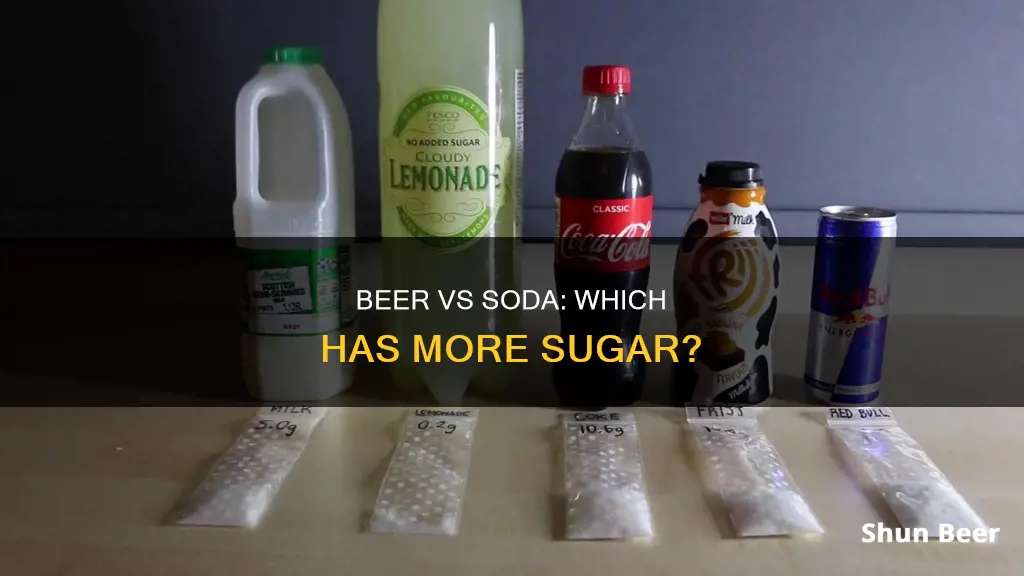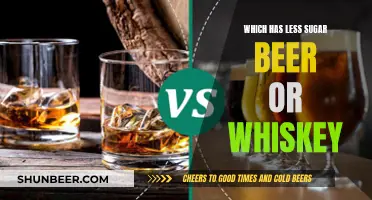
Beer and soda are both popular drinks, but which is healthier? When comparing the two, it's important to consider their sugar content, as well as other factors such as calories, ingredients, and potential health risks. While both drinks can have negative health impacts when consumed in excess, there are some key differences in their nutritional content and how they affect the body. So, does beer have more sugar than soda, and which comes out on top in the battle for the healthier drink?
What You'll Learn

Beer has fewer calories than soda
When it comes to sugar content, beer is the clear winner. But what about calories? Does beer have fewer calories than soda? Let's find out!
While it's true that beer contains very little sugar, with an average 12-ounce serving containing around 1 to 2 grams, it's not exactly a low-calorie drink. A standard 12-ounce can of beer typically contains approximately 100 to 150 calories. However, when compared to soda, beer still comes out on top in terms of calorie count.
Calorie Comparison
Your average soda contains anywhere from 140 to 170 calories or more, depending on the brand. These calories are empty calories, providing no nutritional value. So, if you're watching your calorie intake, soda may not be the best choice.
Different Types of Beer, Different Calorie Counts
It's important to note that the calorie content of beer can vary depending on the type of beer you're drinking. For example, light beers typically have a lower alcohol content and contain around 90 to 100 calories per 12-ounce serving. On the other hand, craft beers can have a wide range of alcohol content, resulting in a calorie count that can go as high as 250 calories per 12-ounce serving. So, while beer generally has fewer calories than soda, there are still some beers that may be more calorie-dense.
The Impact of Calories on Health
Consuming too many calories, regardless of the source, can lead to weight gain and other health issues. However, it's important to remember that calories are just one part of the equation when it comes to health. The type of calories and the nutritional value of the food or drink also play a significant role. As mentioned earlier, soda provides empty calories, while beer can offer some nutritional benefits due to the ingredients used in the brewing process.
Making Informed Choices
When choosing between beer and soda, it's important to consider not only the calorie content but also the overall impact on your health. Both drinks have their downsides and should be consumed in moderation. However, if you're looking to cut down on calories, beer may be the better choice, especially when compared to high-calorie sodas.
Sugar in Beer: How Many Grams?
You may want to see also

Beer has no sugar
When it comes to choosing a beverage, it's important to consider not just the taste but also the nutritional content. While personal preference plays a role, it's worth knowing that some drinks are healthier than others. Beer and soda are two popular choices, but how do they compare in terms of sugar content?
Beer contains little to no sugar. The sugar in beer comes from the natural sugars found in the grains used during the brewing process. However, during fermentation, yeast consumes much of this sugar to produce alcohol, resulting in a very low final sugar content. On average, a standard 12-ounce serving of regular beer contains around 1 to 2 grams of sugar. Light beers may have slightly less, while craft or specialty beers with added ingredients might have slightly more.
Comparatively, soda is notorious for its high sugar content. A typical 12-ounce can of soda contains about 39 grams of sugar, which is equal to about 9 teaspoons. This amount far exceeds the recommended daily sugar intake for both men and women, as advised by the American Heart Association (AHA). The high sugar content in soda contributes to various health issues, including higher blood pressure, inflammation, weight gain, diabetes, and fatty liver disease.
The difference in sugar content between beer and soda is significant. While beer does contain a small amount of residual sugar from the fermentation process, it pales in comparison to the high levels found in soda. This makes beer a better choice for those conscious of their sugar intake.
In addition to its low sugar content, beer also offers some nutritional benefits. Beer contains protein, potassium, and antioxidants due to the ingredients used in the brewing process. It provides vitamins such as thiamin, riboflavin, niacin, vitamin B-6, follate, and vitamin B-12. These vitamins are not present in soda.
When it comes to sugar content, beer is the clear winner. With virtually no sugar and some nutritional benefits, beer is a healthier choice than soda. However, it's important to remember that both drinks have their downsides and should be consumed in moderation. Excessive consumption of alcohol in beer can lead to health issues, and the calories in both drinks can contribute to weight gain.
Beer and Sugar: What's the Connection?
You may want to see also

Soda has no nutritional value
Soda has zero nutritional value. It contains no vitamins or minerals and is not a good source of dietary protein, which is important for muscle growth, appetite control, tissue repair, bone health, and healthy aging.
Soda is typically void of vitamins and minerals. According to the USDA food database, a 12-ounce can of Coca-Cola contains no essential nutrients, such as potassium, calcium, or iron. It also does not contain any vitamin A, C, E, D, K, or B.
Soda is also free from healthy dietary fats, such as omega-3s and omega-6s. While this means it is free from harmful trans fats, the lack of healthy fats means it has no nutritional value.
Soda is also associated with several health complications, including chronic diseases such as type 2 diabetes and obesity. The high sugar content in soda can lead to insulin resistance and spikes in blood sugar, which can be harmful over time. Research has also shown that sugar-sweetened beverages are linked to weight gain, particularly in children and adolescents.
Soda is also associated with an increased risk of gout, a disease characterized by sudden and severe pain in the joints. The combination of sugar and acids in soda can also lead to tooth decay and enamel erosion.
While soda can be hydrating, the caffeine content can contribute to dehydration if consumed in large quantities or by those unaccustomed to drinking caffeine.
In summary, soda has no nutritional value and is associated with several negative health outcomes. It is best to limit consumption and choose healthier alternatives such as milk, coffee, tea, or fruit-infused water.
Beer and Blood Sugar: A Surprising Relationship
You may want to see also

Beer has a higher glycemic resistance
When it comes to health and nutrition, the drinks we consume are just as important as the food we eat. Beer and soda have their drawbacks, and it's essential to understand their effects on our bodies to make informed choices. While both drinks can impact health when consumed in excess, it's worth examining the differences between them.
The glycemic index and load are crucial factors in understanding how different foods and beverages affect our bodies. A diet focused on a low glycemic load has several benefits, including weight loss, improved blood sugar control, reduced risk of circulation disease, and a lower likelihood of developing diabetes. Beer has a distinct advantage in this regard, as it usually has a lower glycemic load than soda. This means that choosing beer over soda can contribute to better blood sugar management and a reduced risk of diabetes.
Beer's higher glycemic resistance is worth highlighting. This means that it causes a slower and smaller increase in blood sugar levels compared to soda. This is especially relevant for individuals with insulin resistance or those at risk of developing diabetes. Bysection, choosing beverages with a lower glycemic index and load can help manage blood sugar levels and potentially prevent or delay the onset of diabetes.
In addition to its higher glycemic resistance, beer also offers some nutritional benefits that soda lacks. Beer contains protein, potassium, and antioxidants due to the ingredients used in the brewing process. While the amounts may not be sufficient to meet daily nutrient requirements, they contribute to beer's overall nutritional profile. On the other hand, soda typically contains high levels of processed sugar, which is associated with reduced insulin resistance and an increased vulnerability to diseases like diabetes.
While beer has a higher glycemic resistance and offers some nutritional advantages, it's important to remember that both beer and soda should be consumed in moderation. Excessive consumption of either beverage can lead to health issues. Enjoying them in moderation, coupled with a balanced diet and healthy lifestyle choices, is key to maintaining overall health and well-being.
Budweiser Beer: Sugar Content and Nutritional Facts
You may want to see also

Soda is linked to diabetes
While beer and soda are both bad for you, the latter is linked to diabetes. According to a European study involving 350,000 people from eight countries, drinking a soda a day can increase your chances of diabetes by 22%. This is supported by a 2010 study, which found that the risk of developing diabetes is 26% higher for people who consume one or more sugary drinks every day.
Research suggests that drinking too much soda is strongly linked to diabetes. In the US, an estimated 9.4% of the population has diabetes, making it the seventh leading cause of mortality in the country. While type 1 diabetes is not preventable, individuals can take steps to reduce the more common type 2 by moderating sugar intake.
A 2016 study found that sugar-sweetened beverages contribute to the progression of insulin resistance and prediabetes, the stage before full diabetes. Insulin resistance is central to the development of type 2 diabetes. It occurs when the cells become used to an excess of sugar in the bloodstream and do not absorb glucose as effectively, responding less to insulin. Insulin is the hormone that unlocks cells, allowing glucose to enter.
Drinking too many sweetened drinks means that the body stores excess energy in the form of fat, so drinking too much soda can play a part in the development of overweight and obesity. Research has shown that being overweight or obese is a risk factor for type 2 diabetes and other conditions.
A review of relevant studies, compiled in 2015, confirmed the relationship between diabetes and beverages sweetened with sugar, despite the exact biological mechanisms remaining unclear. One study, published by The American Journal of Clinical Nutrition in 2010, investigated the relationship between the diet and health of 91,249 female nurses over 8 years. They found a link between a diet with a high glycemic index (GI), or quickly digested foods and drinks that cause a spike in blood sugar, and type 2 diabetes.
The risk for diabetes was high even after taking into account other known risks and dietary factors involved in diabetes. In fact, the diabetes risk associated with a high energy intake was greater than that of consuming unhealthy fats. The authors explained the following process through which high sugar intake could lead to diabetes:
- Higher blood glucose concentrations from a high load of quick-digesting carbs mean more demand for insulin.
- Higher demand for insulin in the long term wears out the pancreas. This can result in glucose intolerance from the cells.
- High-GI diets may, therefore, directly increase insulin resistance.
As soda has an extremely high GI, it may well contribute to this process. The review also supports the suggestion that high sugar intake adds to obesity by increasing the total energy consumed.
In other words, as sugary beverages add to the overall daily intake of calories, the increase in calories likely leads to an increase in weight. The paper also investigated the idea of sugar-sweetened drinks more directly causing type 2 diabetes. They concluded that research in this area had not yet been able to rule out other factors, such as obesity, and that further research is needed.
A case-cohort study from 2013 investigating the relationship between sugar-sweetened drinks and diabetes compared data about the soda consumption habits of 11,684 people with type 2 diabetes to those of 15,374 people who did not have diabetes. The team found that people who consumed one or more sugar-sweetened drinks every day had a higher risk for diabetes than those who drank less than one a month. Even when energy intake and body mass index (BMI) were accounted for, the high soda drinkers still had a higher risk for type 2 diabetes.
The authors of the report speculated how sugar-sweetened drinks could potentially cause type 2 diabetes, but, as with other researchers, could offer no firm conclusions. Their study could not prove a direct causal link between soda and diabetes risk, just a correlation between the two. The authors did, however, suggest that the link could be due to "an effect on weight gain," as well as the "glycemic effects" of sugar-sweetened drinks "inducing rapid spikes in glucose and insulin and causing insulin resistance."
While switching to artificially sweetened or 'diet' soda may not reduce the risk of diabetes, it is important to note that research on these beverages has reached more varied conclusions. A 2018 investigation suggests that artificially sweetened beverage consumption cannot be ruled out as a risk factor for diabetes.
In conclusion, while beer and soda are both detrimental to health, the latter has a stronger link to diabetes. The excessive sugar content in soda contributes to weight gain and insulin resistance, which are risk factors for developing type 2 diabetes. While the exact biological mechanisms are still being studied, current research underscores the importance of limiting soda consumption to maintain a healthy weight and lower the risk of diabetes.
Sour Beers: High Sugar Content or Healthy Choice?
You may want to see also
Frequently asked questions
No, beer does not have more sugar than soda. A 12-ounce can of soda contains about 39 to 40 grams of sugar, while a 12-ounce serving of beer contains around 1 to 2 grams of sugar.
Yes, beer does contain a small amount of residual sugar from the fermentation process, but it is significantly less than that found in soda.
During the brewing process, yeast consumes much of the sugar in beer to produce alcohol, resulting in a lower final sugar content.
Both drinks have their drawbacks and should be consumed in moderation. However, soda has zero health benefits and can contribute to health issues such as weight gain, diabetes, and fatty liver disease due to its high sugar content. Beer, on the other hand, contains some nutrients and antioxidants, and moderate consumption may have potential health benefits.
Both beer and soda can be addictive due to their ability to release endorphins in the brain. However, the main difference is that excessive beer consumption can lead to intoxication, impairing judgment and coordination.







